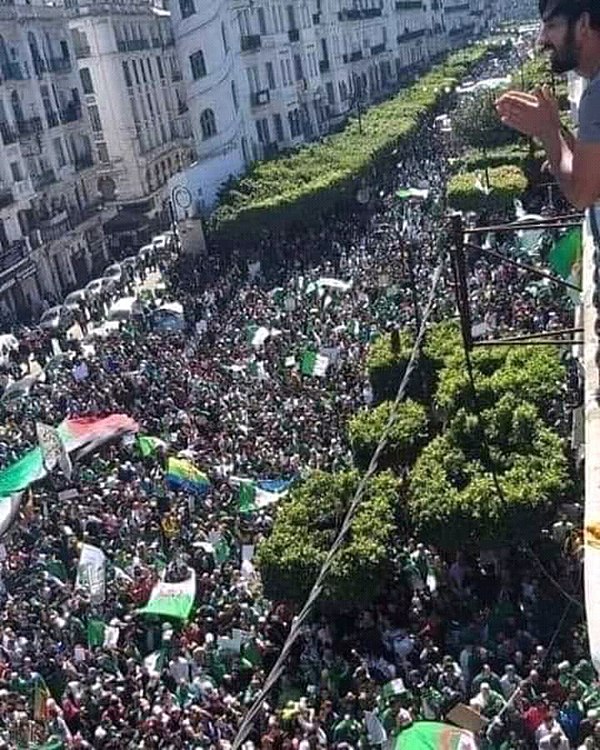As foreign commentators predict its end or failure – Algerians march on. But not without the anxiety, worry and deep concern about how best to proceed.
On the 22 February 2019, Algerians launched one of the most impressive social movements for democracy the world has seen – and one which is largely unreported in the West. Upon the trigger of President Bouteflika’s decision to stand for a fifth mandate, violating the constitution, following Friday prayers, millions of Algerians took to the streets to demonstrate for democracy –breaking a wall of fear against protest.
And they have occupied that space ever since.
Every Friday since that date, millions of Algerians have marched in every city of the country. Every Tuesday millions of students have marched. And every week, concessions and reforms have been made in response.
Bouteflika’s decision triggered the protests, violating the constitutional limits to presidential mandates. However, this came on top of the existing constitutional violation that his ill health presented. Not seen in public since 2013 following a stroke – Bouteflika had been strikingly absent from public life. Article 102 of the Algerian constitution requires an incapacitated president to stand down and be replaced by the Head of the Senate. That the president was in a hospital in Geneva at the time of the decision to stand again, simply reinforced the image of an out of touch and privileged elite who had failed Algerian public services, whilst profiting themselves in Europe. This humiliation was the last straw. It unleashed a phenomenal and impressive movement in Algeria, nothing less than a revolution. And it is one which has taken over every city, every institution, every family and every individual man, woman and child across the country.
Bouteflika stood down in April 2019. Many high-ranking politicians have been tried on corruption charges and imprisoned. Businessmen connected to the elite have been tried. With each demonstration, the Hirak has won concessions from the regime – and they are not giving in until as the rallying cry calls for – Yetnahaw Gaa – all those associated with the regime Must Get Out.
Young people, including millions of students, drive these peaceful demonstrations, with women and families playing an important role. The Hirak seems to have no leaders. It has developed slogans, songs, many taken from the football stadiums where an intelligent and astute political narrative has developed in recent years. It continues in multiple forms from cultural activities in main squares, dialogue and debates on the steps of the national theatre, to collective cleaning up of public spaces. The creative energy, ideas of the young people, women, students, workers – all sectors of society – is its lifeblood.
Until now, the vast majority of the marches have been peaceful. Political arrests of leading opposition leaders, protesters and ordinary individuals, have had no effect in diminishing the creative energy of the marches, nor the ever present eye of an increasingly politically engaged public over all political decisions.
Indeed, this week has seen a massive escalation of the protests in response to what is seen as now an illegitimate government trying to pass new bills in Algeria. Combined with cases of violence against students – the reasons for maintaining the protests are profound ones and Algerians will continue to demonstrate. And they are doing so in beautiful and impressive ways. Marching and chanting together in front of an obsolete parliament, questioning the legitimacy of passing of bills and laws, could never before have been imagined.
Algerians have truly broken the wall of fear. In doing so, they have raised political consciousness and engagement in an overwhelming majority of the population. Most importantly, however, is the question of reconciliation between Algerians, with all sections of society marching and protesting together. These are the beautiful moments of the Hirak – when thousands of people have been vocally challenging detentions, using the “mahraz”, in solidarity with detainees. Or when the Algerian Youth Orchestra took over public space in Jijel and performed to local people. When in Blida, artists have claimed back the square through the cultural Hirak.
As foreign commentators predict its end or failure – Algerians march on. But not without the anxiety, worry and deep concern about how best to proceed. The question remains what next. Can a proposed 12 December election take place if not all members of the Issaba – the bandits as the regime has been renamed – are gone?
Who can stand in these presidential elections, who is completely untied to a regime which infiltrated so much of Algerian life? How to proceed knowing the history of violence which claimed so many Algerian lives in the 1990s?
Whilst challenges are significant, there remains huge hope on the streets of Algeria. There are many reasons to be optimistic about the political future of Algeria. First, Algeria has a highly educated population – the number of universities and the number of students has increased dramatically in the last decades – and these are the heart of debates about reform and development of the country. Second, the Arab Spring in Algeria happened in 1988. Algeria’s democratisation process in 1990 – despite its tragic consequences of the cancelled elections in 1991 and the violence that ensued – left a Constitution which allowed associations and political parties to form. Despite the violence, Algerians have mobilised and organised in their thousands since 1990 in the most difficult of conditions.
The escalation of the Hirak this week by students and their adult supporters, around ongoing demands for democracy, is important. Young people will play a vital role in whatever happens next. All Algerians, but especially universities, associations and journalists who are able to understand these complex dynamics and potential, must play close attention to the next weeks. If they do so, they will be able to contribute positively to supporting, or at the very least to the recognition of, one of the most powerful and promising revolutions in Africa.










